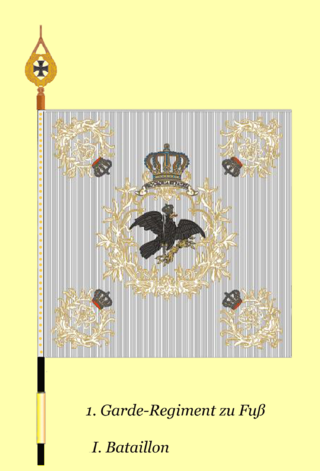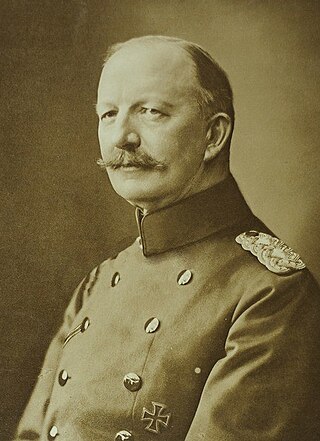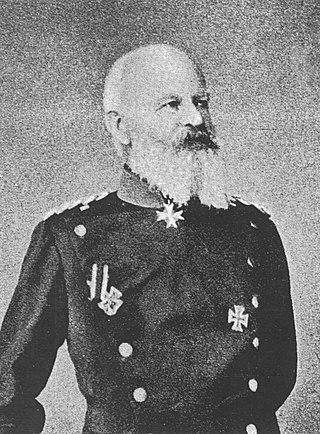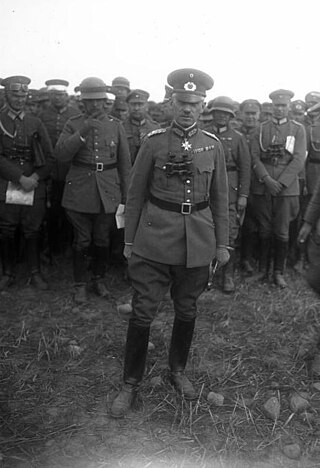
Georg Leo Graf von Caprivi de Caprara de Montecuccoli was a German general and statesman who served as the chancellor of the German Empire from March 1890 to October 1894. Caprivi promoted industrial and commercial development, and concluded numerous bilateral treaties for reduction of tariff barriers. However, this movement toward free trade angered the conservative agrarian interests, especially the Junkers. He promised educational reforms to the Catholic Center party which would increase their influence, but failed to deliver. As part of Kaiser Wilhelm's "new course" in foreign policy, Caprivi abandoned Bismarck's military, economic, and ideological cooperation with the Russian Empire, which historians consider a major mistake. Even worse, Caprivi misjudged multiple opportunities to open good relations with the United Kingdom of Great Britain and Ireland. Frustrated, Britain turned to the Empire of Japan and the French Third Republic for agreements. Caprivi's downfall came with trade agreements that favored German industry and urban workers over more powerful agricultural interests. Historians praise his refusal to renew the harsh restrictions on socialists, and his success in the reorganization of the German military.

The Pour le Mérite is an order of merit established in 1740 by King Frederick II of Prussia. The Pour le Mérite was awarded as both a military and civil honour and ranked, along with the Order of the Black Eagle, the Order of the Red Eagle and the House Order of Hohenzollern, among the highest orders of merit in the Kingdom of Prussia. The order of merit was the highest royal Prussian order of bravery for officers of all ranks.

Job Wilhelm Georg Erdmann Erwin von Witzleben was a German field marshal in the Wehrmacht during the Second World War. A leading conspirator in the 20 July plot to assassinate Adolf Hitler, he was designated to become Commander-in-Chief of the Wehrmacht in a post-Nazi regime had the plot succeeded.

August Wilhelm Antonius Graf Neidhardt von Gneisenau was a Prussian field marshal. He was a prominent figure in the reform of the Prussian military and the War of Liberation.

Alfred Ludwig Heinrich Karl Graf von Waldersee was a German field marshal (Generalfeldmarschall) who became Chief of the Imperial German General Staff.

Karl Wilhelm Georg von Grolman(n) (30 July 1777 – 1 June 1843) was a Prussian general who fought in the Napoleonic Wars.
Waldersee is a surname. Notable people with the surname include:

Friedrich August Eberhard von Mackensen was a German general and war criminal during World War II who served as commander of the 1st Panzer Army and the 14th Army. Following the war, Mackensen stood trial for war crimes before a British military tribunal in Italy where he was convicted and sentenced to death for his involvement in the Ardeatine massacre, in which hundreds of Italian civilians and political prisoners were shot. The sentence was later commuted and Mackensen was released in 1952. He died in West Germany in 1969.
This is the German Army order of battle on the outbreak of World War I in August 1914.

The German ancient noble family of Pfuel arrived in Brandenburg in the year 926 and later widened their influence to Saxony, Saxony-Anhalt, Mecklenburg, Pomerania, Württemberg, Westphalia, Eastern Europe and Sweden.

(Ludwig Friedrich) Leopold von Gerlach was a Prussian army general, adjutant to King Frederick William IV of Prussia and a Protestant conservative associate of Otto von Bismarck.
Karl Graf von der Gröben was a Prussian general.
Georg von Sodenstern was a German general in the Wehrmacht during World War II who commanded the 19th Army. He was also a recipient of the Knight's Cross of the Iron Cross of Nazi Germany.

The 1st Foot Guard Regiment was an infantry regiment of the Royal Prussian Army formed in 1806 after Napoleon defeated Prussia in the Battle of Jena–Auerstedt. It was formed by combining all previous Foot Guard Regiments and was, from its inception, the bodyguard-regiment of Kings of Prussia. Save William II, who also wore the uniforms of other regiments, all Prussian Kings and most Princes of Prussia wore the uniform of the 1st Foot Guard Regiment. All Princes of Prussia were commissioned lieutenants in the 1st Foot Guards upon their tenth birthdays. The King of Prussia was also the Colonel-in-chief of the regiment, as well as the Chief of the 1st Battalion and 1st Company of the regiment. Therefore, the regiment held the highest rank within the Prussian Army, which, among other things, meant that the officer corps of the regiment marched before the princes of the German Empire and the diplomatic corps in the traditional New Year's reception. Unofficially, the regiment was known as the "First Regiment of Christendom".

Herrmann Gustav Karl Max von Fabeck was a Prussian military officer and a German General der Infantarie during World War I. He commanded the 13th Corps in the 5th Army and took part in the Race to the Sea on the Western Front and also commanded the new 11th Army on the Eastern Front. Subsequently, he commanded several German armies during the war until his evacuation from the front due to illness in 1916 and died on 16 December. A competent and highly decorated commander, von Fabeck is a recipient of the Pour le Mérite, Prussia's and Germany's highest military honor.

Schlieffen is the name of an old German noble family from Pomerania. The family, branches of which still exist today, originates in Kolberg.
Friedrich Bernhard Karl Gustav Ulrich Erich Graf von der Schulenburg was a Prussian General during World War I and a member of the Nazi Party during the inter-war period.

Theodor Alexander Viktor Ernst von Schoeler was a Prussian General of the Infantry who served in the Austro-Prussian War and the Franco-Prussian War through several battles.
Ernst August Anton Hermann Otto von Lauenstein was a Prussian Generalleutnant who served during World War I. He was chief of staff of the 2nd Army and later commanded the XXXIX Reserve Corps.

Otto Hasse was a German General of the Infantry and from 1923 to 1925 Chief of the Truppenamt.













